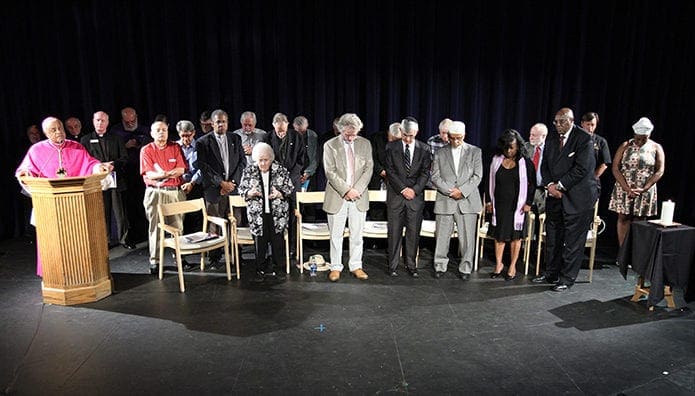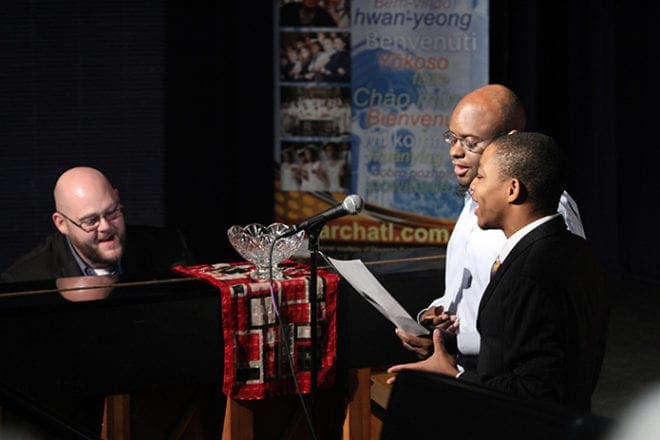 Photo By Michael Alexander
Photo By Michael AlexanderAtlanta
One candle at interfaith event symbolizes shared hope for peace
By ANDREW NELSON, Staff Writer | Published September 1, 2016
ATLANTA—Believers from many faiths came together Monday, Aug. 29, to pray for peace in a summer discolored by violence on America’s streets, terrorist attacks in Europe, and violence around the globe.
Archbishop Wilton D. Gregory prayed alongside leaders of Jewish, Islamic, Buddhist and other Christian communities at “An Evening Prayer for Peace.”
The leaders were seated on a stage in a Marist School auditorium. The stage was bare except for a white candle. Its lit flame was “to remind us we are all seekers of peace, and we will do what we can for peace,” said Sister Margaret McAnoy, a member of the Sisters, Servants of the Immaculate Heart of Mary religious community. She is also the vicar for religious of the Atlanta Archdiocese.
Speaking to Christians, Muslims, Jews, Buddhists and Sikhs, as well as believers of other faiths, the archbishop said, “We come together to pray that none of us loses heart or succumbs to despair. We call upon the consolation and hope to be found within our individual faiths and together we unite our individual prayers with those from other religious traditions, imploring the all-powerful God of us all to respond to our petitions with his concern and love for every person on this planet.”

Dónal Noonan, left, director of music at the Shrine of the Immaculate Conception, Atlanta, accompanies Atlanta Homeward Choir members Bryant Allen, foreground, and Marvin Coine as they lead those on hand in singing “Let There Be Peace On Earth.” Photo By Michael Alexander
Reflections were given at the one-hour event by Rabbi Scott Colbert, of Temple Emanu-El, Atlanta; Imam Plemon El-Amin, imam emeritus of the Atlanta Masjid of Al-Islam; Gareth Young, a Buddhist; Rev. Lola Scott Russell, pastor from the African Methodist Episcopal Church; and Archbishop Gregory.
Speakers decried violence by people who claim their violence serves a religious purpose.
Archbishop Gregory said those attacks serve as a “a great scandal to the world and an obstacle to the healing of our human sorrows.”
Imam El-Amin told the audience Muslims suffer from acts of terrorism. Some 2 million lives have been lost since the 9/11 attacks through cluster bombs, loss of access to water and medical care, and at the hands of groups claiming to act in the name of Islam, he said.
He prayed God “guide our hearts and not our missiles. … Lead us out of the darkness of death and destruction.”
Reading from the Old Testament, the Rev. Russell used Ezekiel’s vision of the valley of dry bones who were restored to life to envision people uniting around justice. She said violence takes root when people shape their lives listening to a single story.
“The single story creates stereotypes, and the problem with stereotypes is not that they are untrue, but they are incomplete,” she said, quoting Nigerian writer Chimamanda Ngozi Adichie.
“A martyr is one who makes great sacrifices or suffers much in order to further a belief, in order to further a cause, or a principle. We must complete the story of who the martyrs are and not infuse our limited single story minds to narrow it only to those who just look like us, who worship like us, who speak our language, and were born or not born with our gender,” she said.
Listening to others serves as a pathway to peace, she said.
She said, “It is to sit at the table of sisterhood and brotherhood and hear their stories because then and only then will we find peace.”
Extreme violence this summer impacted U.S. cities, a small French church, the Riviera during a holiday celebration. Following police shootings in different locations that resulted in the deaths of black men, protests began in the United States. Then, five Dallas police officers were killed by a sniper while on duty at a peaceful protest. Subsequently three Baton Rouge, Louisiana, officers were slain. In Europe, a terrorist killed scores of people in Nice, France. Father Jacques Hamel, an elderly French Catholic priest, was executed by two men while celebrating Mass. The Islamic State claimed responsibility. In the Middle East, the Syrian conflict has created 4.8 million refugees who risked their lives to escape to other countries. In Africa, militants kidnap innocents and attack civilians.
Still, around the world, as a sign of respect, members of different faiths have shown their support for communities who have suffered attacks. For example, Muslims and Jews across Europe attended vigils and Masses in a sign of solidarity with Christians after the murder of Father Hamel.
The evening’s event in Atlanta concluded with people shaking hands and saying, “Peace be with you.”
Iman El-Amin opened his remarks by calling upon God, “the merciful benefactor, the merciful redeemer.” He said people can find peace if they seek God’s ways. People need to put aside “self-righteousness that will not compromise” and instead “seek (God’s) peace, not just ours. Help us to seek (God’s) justice, not just ours,” he said.
For the audience, the opportunity to hear from a cross section of religious leaders was unique.
Joyce McBee, who attends St. Paul of the Cross Church, Atlanta, attended because she has lost a loved one, who was shot and killed. She said while the service focused on those killed because of their faith, she still felt a need to be with others and pray for an end to violence, whether from guns or drugs.
Rhonde Chambliss, who attends St. Philip Benizi Church, Jonesboro, said she attended because although her community has links with the Jewish community, she hadn’t heard from other faith leaders on this crisis. She said the imam was informative, explaining how the Muslim community also has been targeted by terrorists. She said she wanted to “hear all the different voices” speak about peace.